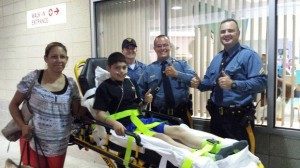Most 12-year-old boys like to hang with their friends, play video games, ride bikes and just have fun. To an adult, these activities seem like simple pleasures that many look back on fondly. It’s a carefree time to be a young person and enjoy life. Everyone deserves these experiences and memories in life, but not everyone is lucky enough to have them.
In 2012, Josh Fernandez’s mother, Claudia, wasn’t sure about her then nine-year-old son’s future. For many years, Josh’s health was fine and doctors believed that he had asthma. But, Claudia could see that he had difficulty breathing, and pushed to find answers to her son’s illness. After seeing several doctors and going through numerous tests, Josh was given a diagnosis.
Because Josh was born 32 weeks premature, he had to stay in the hospital for several months. During this time, he contracted a viral bronchial disease. Claudia learned that the disease had damaged her son’s lungs, but she never imagined how badly. At this point, Josh needed to rely on oxygen 24 hours a day in order to keep his oxygen levels up. Josh’s mood began to change from being tethered to a machine. A once active child, now Josh didn’t want to go outside. It was a hassle to take the oxygen with him, and he began to show signs of depression.
Doctors told Claudia that Josh would need a transplant to survive. She was in shock and couldn’t believe what she was hearing. They estimated that Josh would only be able to survive another two years without a life-saving organ transplant.
“I couldn’t believe that he needed a transplant. It was so scary to think about. It was difficult for him to be that sick, and he had a really hard time breathing.” said Claudia. “He couldn’t ride his bike anymore. He had to quit the basketball team. He was lucky to have friends that were very supportive of him. They made him feel like things were normal, which was important because he had to give up a lot.”

Claudia Fernandez and her son, Joshua, 12, arrive at the Children’s Hospital of Philadelphia for his lung transplant, accompanied by three state troopers from South Jersey who transported them there. (Courtesy of Chatham Borough Police Department)
Josh was added to the organ transplant waitlist, and three weeks later he received the call of a lifetime – lungs were available for him. “We had so much support from the community during that time.” said Claudia. “Our church, neighbors and Josh’s school really helped us.”
Today, Josh is several months post-transplant and he is living a different life. “At first, he was scared to take off his oxygen, but then he got used to it. He feels like he can conquer the world now. He is happy and excited, and is doing all of the things that other pre-teens do. He loves to swim – in both the ocean and the pool, he plays soccer and basketball and loves to ride his bike.”
Claudia refers to Josh’s donor as their “little angel.” She said, “I admire the parents who had the courage in a terrible moment to think about another family. I am so grateful. It’s an amazing gift and has given my son his quality of life back.”
September 15-October 15th is Hispanic Heritage Month, and it is a great opportunity to reach minority communities about the importance of registering as an organ donor. It’s also a time to recognize Hispanics who have received the gift of life – like Josh Fernandez – and those who are currently waiting for a life-saving organ transplant. It’s also an opportunity to honor the generosity of individuals and families who were able to give to others through donation.
Today, there is a critical need to increase the number of registered organ and tissue donors in Gift of Life Donor Program’s region (eastern PA, southern NJ and DE) – with nearly 5,300 men, women and children awaiting a life-saving organ transplant. In the U.S., over 115,000 people are waiting. Nationally, minority communities constitute 36% of the population, but represent a startling 58% of those waiting for a life-saving organ transplant.
